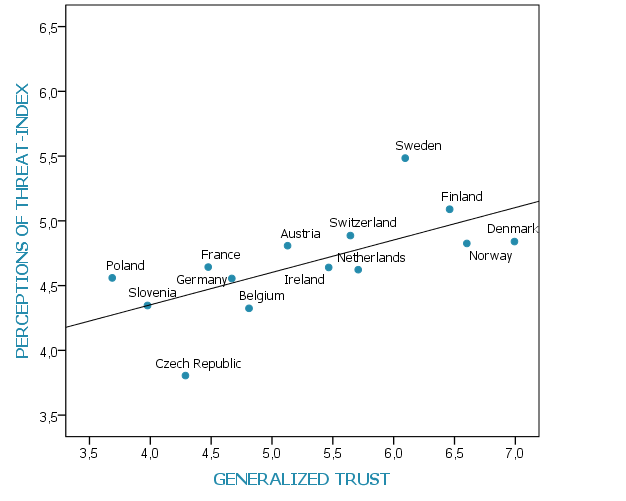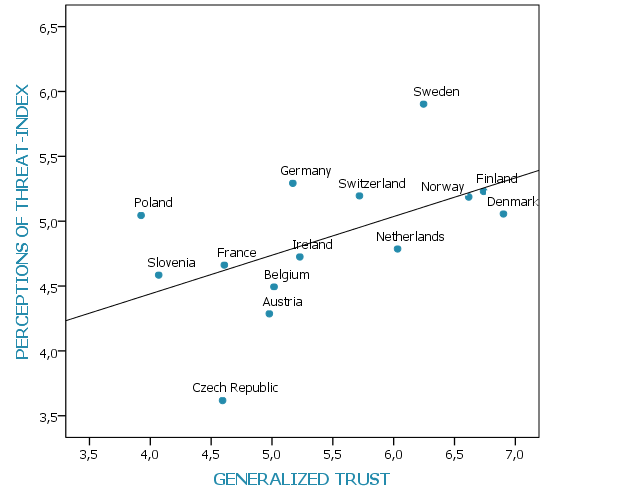JOSEFINA SIPINEN & MARIA BÄCK
Since the summer of 2015, the refugee crisis has become one of the most urgent issues that the European countries seek to solve together – or separately. Due to the crisis, the opinion climate across Europe has been largely affected by different perceptions of threat that immigration is seen to constitute. While there are several factors that may increase the perceptions of threat, there are also factors that reduce them. One such factor is generalized social trust, and its effects can be noted both at the individual and the societal level.
Social trust may refer to different types of interpersonal trust: while particularized trust is directed to individuals we already know and whose trustworthiness we can assess according to their previous behavior and actions, generalized trust is perceived as a moral value and an idea that ‘most people’, even those we do not know from before, can be trusted.
Generalized trust makes people want to work together for the common good by promoting cooperative social relations. It has the potential to bring people with different backgrounds together and improve social cohesion between groups.
There are several possible ways that lead from generalized trust to more positive and accepting views on immigrants and immigration, and the paths may be either direct or indirect.
First, individuals who have high generalized trust hold less prejudiced views and are not as suspicious of people from other cultures than mistrusters, because they do not feel that the immigrants will take away benefits, increase crime rates or take away their jobs.
Second, generalized trust breeds solidarity and tolerance. People who trust in ‘most people in general’ believe in a common culture and the obligation to cooperate with and empower minorities and new ethnic groups.
Generalized trust can be seen both as an individual and an aggregate level trait. Some European countries have been more reluctant than others to receive refugees, which has raised questions of European solidarity. Social trust is closely connected to higher levels of tolerance and solidarity, and trusting people are more prone to donate money to charity. Consequently, countries with high aggregated trust are expected to be more willing to receive refugees and grant them asylum.
It may also be easier for countries to commit to helping refugees, when governments believe that others will do the same. Lack of trust leads to non-cooperation, even if it can be expected that everybody loses in such a situation.
According to data from the European Social Survey, generalized social trust does indeed lessen the perceived threats of immigration. Figure 1 and Figure 2 present the mean values of generalized threat and perceptions of threat in 14 European countries in 2002 and 2014.


The Perceptions of Threat-index was constructed by using the following six survey items:
- Would you say that people who come to live here generally take jobs away from workers, or generally help to create new jobs?
- Most people who come to live here work and pay taxes. They also use health and welfare services. On balance, do you think that people who come to live here take out more than they put in or put in more than they take out?
- Would you say it is generally bad or good for country’s economy that people come to live here from other countries?
- Would you say that country’s cultural life is generally undermined or enriched by people coming to live here from other countries?
- Is country made a worse or a better place to live by people coming to live here from other countries?
- Are country’s crime problems made worse or better by people coming to live here from other countries?
The questions in the index represent both economic and cultural dimensions of perceived threat. The response categories all range from 0 to 10, with 0 representing the most negative view and 10 representing the most positive view. The index was coded similarly.
Generalized trust is measured on an 11-point scale also ranging from 0-10: “Generally speaking, do you think that most people can be trusted, or can you never be too careful?” This question is commonly used when measuring generalized social trust.
As can be seen, the feelings of threat are the lowest in the Nordic countries, and in Switzerland. For these countries the perceptions of threat have not changed much in the last decade.
The perceptions of threat seem to have weakened remarkably in Germany. While in 2002, the Germans were among those who felt most threatened by immigrants, the mean value of the index puts the German respondents among the least threatened in 2014.
Austrians, in contrast, feel significantly more threatened in 2014 than in 2002.
The respondents of the Czech Republic demonstrate by far the highest amount of threat by immigrants in both 2002 and 2014.
The scatter diagrams show that there is, indeed, a significant aggregate-level correlation between generalized social trust and the perceived level of threat by immigration. According to a number of regression analyses, the link is also present at the individual level, when controlling for a number of other relevant variables.
In other words, even when including sociodemographic background variables, variables that describe economic self- and group interest and social interaction (e.g. unemployment, satisfaction with the economy in the country, friends of other ethnic background and number of immigrants in the living area of the respondent), generalized trust stands out as one of the most important predictors of perceptions of threat.
Josefina Sipinen is PhD student at University of Tampere. The topic of her doctoral dissertation is political resocialization of immigrants.
Maria Bäck is PhD and University Lecturer at the School of Management at University of Tampere. She is also in charge of WP 1 in the CONTRE project.


Comments